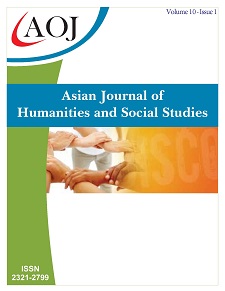The Impact of Economic Crisis on Health of Greek Population and National Health System
DOI:
https://doi.org/10.24203/ajhss.v10i1.6937Keywords:
Economic crisis, Health crisis, Greece, Health systemAbstract
PURPOSE: In this paper, we investigate the impact of the economic crisis on Greece's National Health System and population health. Also included is a critical assessment of the health policies implemented, as compared with other countries, and positive proposals.
ΜETHODS: We used data from international, European, and Greek databases to conduct a literature review and to compile statistics.
RESULTS: Greece spent less on health in 2012 than it did in 2007, as money from the health sector was used for another spending. During the period 2010-2015, both the Physical Health Index and the Mental Health Index showed a significant decline.
Policy planning for health financing has become increasingly important since the crisis. In some countries, targeted policies are being implemented to protect the poor and avoid adverse employment effects.
CONCLUSIONS: A time of financial crisis tends to require more, not less, resources for health systems to meet the greater need for health care and increase reliance on publicly funded services.
During the financial crisis, fiscal and health policies differed between countries, reflecting policy decisions.
In achieving fiscal balance, it is important not to sacrifice financial protection, access, efficiency, quality, health outcomes, or equality.
References
Stuckler N, Sanjay M. Politics of life and death. How the crisis affects human health [M. Myron, ed.] Athens: Psychogios Publications; 2014.
Rawdanowic L, Wurzel E, and Christensen A. The Equity Implications of Fiscal Consolidations. OECD Economics Department Working Papers, No 1013. Paris, OECD? 2013.
Kyriopoulos G, Athanassakis K, Pavi E. Economic crisis and health. A political economy essay on the reconstruction of the health sector. A: Kastaniotis Publications; 2012.
Thomson S, Figueras J, Evetovits T, et al. Economic crisis, health systems, and health in Europe: impact and implications for policy. World Health Organization, Europe; 2015.
Appleby J. The credit crisis and health care. BMJ. 2008;. 337:1022-1024
Ooms G, Schrecker T. Expenditure ceilings, multilateral financial institutions, and the health of poor populations. 21-27; 365 (9473):1821-3.
7 Navarro V. The world situation and WHO. Lancet. 2004; 363:1321-1323.
Hellenic Statistical Authority. Living conditions in Greece. Athens: Hellenic Republic, Hellenic Statistical Authority; 2015.
Hellenic Statistical Authority. Greece: Life and Health Expectancy 2012. Life expectancy and life expectancy at birth and death. 2015.
Health of Greeks in Crisis. A mapping of the health situation of Greeks and the country's health structures. Institute of Social and Preventive Medicine, March; 2016.
Marmot M, Wilkinson G, et al. Social determinants of health Oxford University Press, Oxford? 1999.
Kondilis E, Giannakopoulos S, Gavana M, Ierodiakonou I, Waitzkin H, Benos A. Crisis and Opportunities. economic crisis, restrictive policies and the population's health and health care: the Greek Case. Am J Public Health; 2013.
Hellas Health V. Health Survey of the Greek Population. The Greek National Health Survey: Institute of Social and Preventive Medicine in collaboration with the Centre for Health Services Studies of the Medical School of the University of Athens. 2013.
Papadeli Ch.,Filippou Ad.,Krachtis Ag.,Tilaveridis I.,Dental care for children with disabilities: the experience of parents-carers after the financial crisis in Greece (a quality study) in Thessaloniki,Asian Journal of Dental studies,2022
Yiotakos O, Tsouvelas C, Kontaxakis V. Suicide and mental health services in Greece. Psychiatry. 2012; 23(1): 29- 38.
OECD. Society at a Glance 2014 Highlights. OECD. 2014.
IOBE, Health Expenditure and Health Policy in Greece under the Memorandum. Athens, September; 2011.
OECD. Health at a glance 2015. 2015.
Downloads
Published
Issue
Section
License
Copyright (c) 2022 Chrysi Papadeli, Adamantia Filippou, Αgisilaos Krachtis, Dimitrios Korsavvidis, Ioannis Papadelis

This work is licensed under a Creative Commons Attribution-NonCommercial 4.0 International License.
- Papers must be submitted on the understanding that they have not been published elsewhere (except in the form of an abstract or as part of a published lecture, review, or thesis) and are not currently under consideration by another journal published by any other publisher.
- It is also the authors responsibility to ensure that the articles emanating from a particular source are submitted with the necessary approval.
- The authors warrant that the paper is original and that he/she is the author of the paper, except for material that is clearly identified as to its original source, with permission notices from the copyright owners where required.
- The authors ensure that all the references carefully and they are accurate in the text as well as in the list of references (and vice versa).
- Authors retain copyright and grant the journal right of first publication with the work simultaneously licensed under a Attribution-NonCommercial 4.0 International that allows others to share the work with an acknowledgement of the work's authorship and initial publication in this journal.
- Authors are able to enter into separate, additional contractual arrangements for the non-exclusive distribution of the journal's published version of the work (e.g., post it to an institutional repository or publish it in a book), with an acknowledgement of its initial publication in this journal.
- Authors are permitted and encouraged to post their work online (e.g., in institutional repositories or on their website) prior to and during the submission process, as it can lead to productive exchanges, as well as earlier and greater citation of published work (See The Effect of Open Access).
- The journal/publisher is not responsible for subsequent uses of the work. It is the author's responsibility to bring an infringement action if so desired by the author.


